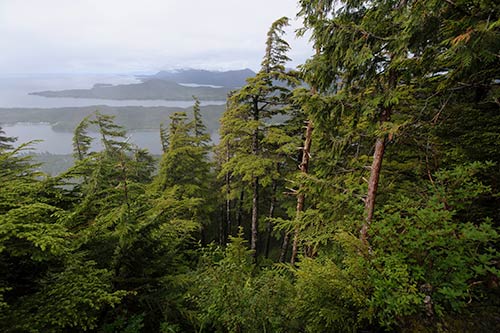
Appeals court revives Alaska suit on roadless ruleBy MARY KAUFFMAN
November 07, 2014
In a 3-0 decision, the U.S. Court of Appeals for the District of Columbia Circuit reversed a federal judge's ruling that Alaska waited too long to file its complaint. The appeals court said Alaska's lawsuit, filed in 2011, was within the required six-year time limit and today sent the lawsuit back to the D.C. District Court for further consideration.
A glimpse of the Tongass National Forest, the nation's largest national forest, covering most of Southeast Alaska.
“The private timber industry is hurting in Alaska. Harvests are a mere fraction of what they once were,” said Senator Coghill. “Of the 16.9 million acres in the Tongass National Forest, we are now only harvesting a mere few thousand acres. Jobs continue to evaporate. The state needs to fight for people’s livelihoods and grow our economy. That’s why this decision is important.” Senator Coghill continued, “At statehood, Alaska was promised access to its natural resources to lessen dependence on the federal government to survive. The decision today allows the state to at least plead its case.” The Forest Service argued to the U.S. Court of Appeals that Alaska’s suit ran out of time because, according to the Forest Service, Alaska’s right of action accrued in 2001 when the Roadless Rule was issued. The court's three-judge appeals panel disagreed, saying, the fundamental problem with the Forest Service’s argument is that the Forest Service repealed the Roadless Rule in 2005. After being repealed by the Forest Service in 2005, it was reinstated in 2006 as a result of an order by the District Court for the Northern District of California. Appeals Circuit Judge Brett Kavanaugh wrote, "But the Forest Service says that this case is different because the rule was reinstated in 2006 as a result of a court order. In our judgment, however, it does not matter for these purposes whether the 2006 rule was issued by the agency acting on its own or as a result of a court order. Either way, when the rule was reinstated in 2006 after its repeal in 2005, a new right of action accrued." "Either way, when the rule was reinstated in 2006 after its repeal in 2005," a new six-year time limit began, Kavanaugh wrote. Alaska had six years from the time of the rule’s reinstatement in 2006 to file a lawsuit challenging the rule. Alaska filed suit in 2011 and the courts ruled Alaska’s suit to be therefore timely. The judgment of the District Court dismissing Alaska’s complaint as untimely was reversed, and the federal appeals court remand to the District Court Alaska’s challengeto the Roadless Rule for consideration. "Timber sales from the Tongass are significantly hindered by the federal Roadless Rule, which prohibits road building and logging in 58.5 million acres of national forests," said Attorney General Michael Geraghty in May 2013. "We believe that the Roadless Rule is invalid, especially as it applies to Alaska and its unique legal circumstances." Instead of hearing the case on the merits, the U.S. District Court for the District of Columbia dismissed Alaska's challenge on the grounds that the State missed the six-year deadline for filing a lawsuit. The State of Alaska appealed the dismissal of the State's challenge to the federal Roadless Rule in May 2013. Today, the U.S. District Court for the District of Columbia held there can be no exceptions to the six-year rule – no matter how compelling the circumstances. In 2001 when the Roadless Rule was established, Alaska filed suit almost immediately. The United States settled this first challenge by agreeing to exempt the Tongass from the Roadless Rule, thus causing the State to dismiss the case. The exemption from the rule remained in place until 2011, when it was struck down in federal district court. Following the invalidation of the Tongass exemption, the State again immediately challenged the Roadless Rule. The State had promptly filed suit twice, and in between it could not challenge the Roadless Rule, because it was not in effect, the State of Alaska asserted that the six-year limitation on suing should be extended. Today, the Court of Appeals for the District of Columbia agreed and reversed the judgment of the District Court's dismissal of Alaska’s complaint as untimely.
On the Web:
|
||
